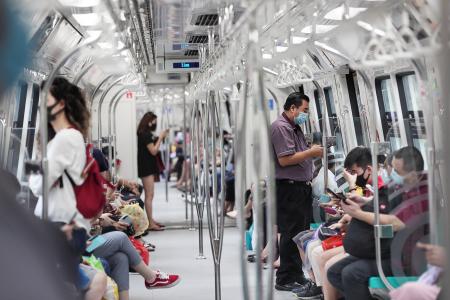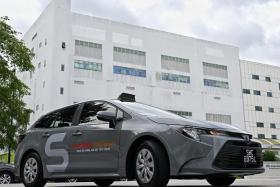More opting for private transport as Covid-19 fears linger: Poll
As Covid-19 fears linger, 22% of people polled are less willing to take buses and trains
Public transport usage may not return to pre-pandemic levels any time soon, a survey has found.
Nearly a quarter, or 22 per cent, of the 459 respondents in Singapore said they were "less willing" to take buses and trains since stay-home measures were implemented.
Another 4 per cent to 6 per cent were unwilling to do so at all.
More than 6,000 people in eight countries took part in the survey on mobility, conducted between June 3 and 10 by American management consultancy Oliver Wyman.
The poll found that ride-hailing and car-sharing services took a heavier hit among people in Singapore, with 26 per cent saying they were less willing to use these now, and another 20 per cent indicating they would steer clear for the time being.
Shared active mobility services bore the brunt of the change, with 54 per cent of respondent saying they would stay away from renting bicycles or e-scooters for now, and another 19 per cent s saying they were less willing to do so.
Conversely, people were warming up to personal transport, with 39 per cent of those polled saying they were more willing to take to commuting by car now. Among those who had been driving before the crisis, 61 per cent were now "more willing to use a car".
Singapore University of Social Sciences transport economist Walter Theseira said the attitude changes were likely to be short-lived.
"Based on experience in other cities, it looks like many commuters are quite limited in their choices," he said.
"That means that many of the big changes that cities talked about in the middle of the lockdowns may not materialise."
LONDON
He said London Tube users "are back, to a considerable extent", despite an earlier government advisory encouraging people to "avoid public transport".
"It's easy to talk about big changes like people giving up public transport and (switching) to biking or driving," Associate Professor Theseira said.
"But for many people, it's simply too difficult or impractical to change."
In Singapore, options are limited "if you don't own a car, you can't afford to take the taxi every day, and you live too far from work to ride a bike", he said.
"And that describes a large number of public transport commuters."
He reckoned that once people stop working from home, public transport ridership will largely revert to what it was.
Hence, a 20 per cent public transport ridership drop over the long run "is a vast overestimate... I don't see how it is possible to accommodate that 20 per cent on other transit modes".
Last month, the Transport Ministry said public transit ridership was around 40 per cent - up from as low as 20 per cent when the circuit breaker measures were implemented in April.
A check on Facebook cycling community pages revealed a number of people have begun cycling to work, though.
Cycling advocate Han Jok Kwang said it has become more popular, with bicycles now in short supply in Singapore, and "a waiting list worldwide".
Get The New Paper on your phone with the free TNP app. Download from the Apple App Store or Google Play Store now



